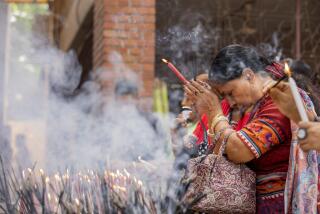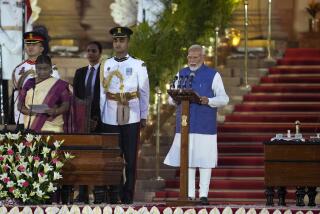India’s Muslims Both Anxious, Hopeful
- Share via
NEW DELHI — As thousands of Muslims from India’s capital hurried through the portals of their country’s most magnificent mosque, some were serene and others pensive about what this week’s change in government means for them.
The previous day, the “saffron wave” of the Hindu nationalist Bharatiya Janata Party carried veteran BJP politician Atal Behari Vajpayee into the prime minister’s chair.
An avowedly Hindu party that champions “one nation, one people, one culture” had taken charge of the world’s largest Muslim minority community.
Paradoxically, some Muslims said they were reassured.
“It’s better that they’re in power. Now they won’t resort to the kind of fanaticism they used to. They’ll be saner and won’t tear down any more mosques,” said Abid Mirza, 24, who sells costume jewelry in the bazaars of Old Delhi.
But for Abdul Rahim, 45, a burly spice merchant and father of three children, recent events were only another trial for India’s Muslims, estimated by their leaders to number as many as 125 million.
In the past, Rahim said, he and other followers of the Koran in India were tricked too many times into voting for the longtime ruling Congress (I) Party and then betrayed by it.
And now, Rahim complained, India has a ruling party with an agenda that calls for the abolition of special marriage, divorce and property laws applying to Muslims.
For Muslims, he said, the BJP’s worst deed was its campaign of religion-driven agitation that culminated, in December 1992, in the destruction by thousands of Hindu marchers of a mosque in the town of Ayodhya, said to lie on the site where Ram, the god-king of ancient Indian history, was born.
Hindu-Muslim violence broke out in several Indian cities after the mosque was torn down, and more than 2,500 people, mostly Muslims, lost their lives.
“Their policies are against us,” Rahim said of India’s new leaders. “But we will not run away. We will stand fast and face up to any challenge.”
Other Muslims concluded that things are not as bad as that. Any menace from a BJP government may be short-lived, they said, because the party has not rallied a parliamentary majority behind it and has only until May 31 to do so.
“All this may simply not last,” mused S.R. Haider, an interpreter at Jama Masjid, the 17th century mosque, as its courtyard, capable of accommodating 20,000 people, filled with barefoot Muslim men awaiting the call to prayer.
Many Muslim intellectuals and leaders believe that the harsh realities of power will make the BJP behave differently in office.
“This Hindutva [Hinduism] by the BJP was to tempt voters, the majority of whom are illiterate and easily swayed by their passions,” said Maulana Wahiduddin Khan, 74, an Islamic scholar in New Delhi. “Once they come into power, they will be just like a Congress government.”
The respect commanded by Vajpayee, who comes from the BJP’s moderate wing, also reassured Muslims, as did his record as foreign minister during the first non-Congress government in 1977-79.
“When Vajpayee was external affairs minister, there were easier contacts with Pakistan, and it was easier to go to and fro,” said Zulfikar Ahmed, 23, who has an uncle in Karachi, Pakistan.
Vajpayee’s televised assurances last week that building Hindu temples at disputed sites is not a top priority for the BJP also eased Muslims’ anxieties.
The prime minister has assured Indians that his government will govern for all and has included a Muslim in his Cabinet.
But some Indians worry that if the new government collapses, it might boomerang on Muslims.
Bal Thackeray, leader of a hard-line Hindu party in the BJP coalition, had threatened “anarchy” if the BJP was not chosen to form India’s government.
“He also means he will sponsor violence if the BJP falls at the end of this month by failing to get a vote of confidence,” D.K. Oza, former chief election officer of Tamil Nadu state, said in a Friday newspaper column.
More to Read
Sign up for Essential California
The most important California stories and recommendations in your inbox every morning.
You may occasionally receive promotional content from the Los Angeles Times.












